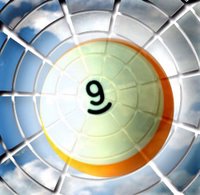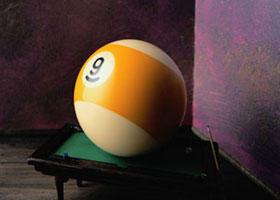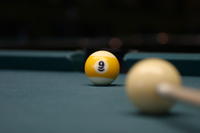Embracing the Winners' Circle
 This week, I wanted to write about my recent experience winning the BCA Amateur 9 Ball Event in Vegas. During this time, I played some of the best pool of my life. On top of that, I felt confident and deserving which, for me, was a true breakthrough. Though I have won smaller tournaments before and done well in other events, I hate to admit it, but last week was the first time I have ever felt completely deserving of entering the "winners' circle." In my previous experiences, as I approached the final four of the tournament and entered the semi-finals or finals, I would find myself inevitably sabotaging my next match(es) and not doing better than I knew I could.
The bottom line, I never accepted that I deserved to be there. I thought I believed in myself and had confidence in my abilities but I never truly embraced it. For the first time last week, I went to bed knowing I was the winner of the winner’s side and would be playing in the finals the next day and I slept great! There was no anxiety about whether or not I was going to win because it didn't matter. I knew I had delivered a strong performance up to that point and I planned on continuing it.
Something funny happens to us when we acknowledge how well we’re doing in a tournament. A strange anxiety overcomes us and we lose focus of what we’re there to do. For me, my goal was not to party in Vegas, or finish in the money, or even to win. My goal was to play well. I set out to apply all the skills that I had acquired over the past twelve months of working with The Monk and to appreciate each shot in front of me. My focus was to deliver my best performance. I can’t control the rolls I get or who my opponent is, but I can control my performance. With this focus new in mind, it was impossible for me to have anxiety about anything else when my sight is set on one thing… playing well.
Unfortunately, as I have learned, this euphoric feeling I write of does not occur naturally, nor can you create it for yourself. It is something that happens after working long, hard hours to develop your game and just letting it blossom. When you are practicing or taking a lesson, you are learning and thinking. Once you’re at the table, competing, you should not be thinking, but trusting. If you work hard, trust and believe in your abilities and “accept your own greatness.” (A good friend once told me that.)
For anyone that has ever felt the anxiety of entering the winners’ circle, do not lose sight of why you are there in the first place. We play this game because we love it. Appreciate every shot in front of you and appreciate yourself for getting you there. You deserve it! Embrace the winners' circle.
This week, I wanted to write about my recent experience winning the BCA Amateur 9 Ball Event in Vegas. During this time, I played some of the best pool of my life. On top of that, I felt confident and deserving which, for me, was a true breakthrough. Though I have won smaller tournaments before and done well in other events, I hate to admit it, but last week was the first time I have ever felt completely deserving of entering the "winners' circle." In my previous experiences, as I approached the final four of the tournament and entered the semi-finals or finals, I would find myself inevitably sabotaging my next match(es) and not doing better than I knew I could.
The bottom line, I never accepted that I deserved to be there. I thought I believed in myself and had confidence in my abilities but I never truly embraced it. For the first time last week, I went to bed knowing I was the winner of the winner’s side and would be playing in the finals the next day and I slept great! There was no anxiety about whether or not I was going to win because it didn't matter. I knew I had delivered a strong performance up to that point and I planned on continuing it.
Something funny happens to us when we acknowledge how well we’re doing in a tournament. A strange anxiety overcomes us and we lose focus of what we’re there to do. For me, my goal was not to party in Vegas, or finish in the money, or even to win. My goal was to play well. I set out to apply all the skills that I had acquired over the past twelve months of working with The Monk and to appreciate each shot in front of me. My focus was to deliver my best performance. I can’t control the rolls I get or who my opponent is, but I can control my performance. With this focus new in mind, it was impossible for me to have anxiety about anything else when my sight is set on one thing… playing well.
Unfortunately, as I have learned, this euphoric feeling I write of does not occur naturally, nor can you create it for yourself. It is something that happens after working long, hard hours to develop your game and just letting it blossom. When you are practicing or taking a lesson, you are learning and thinking. Once you’re at the table, competing, you should not be thinking, but trusting. If you work hard, trust and believe in your abilities and “accept your own greatness.” (A good friend once told me that.)
For anyone that has ever felt the anxiety of entering the winners’ circle, do not lose sight of why you are there in the first place. We play this game because we love it. Appreciate every shot in front of you and appreciate yourself for getting you there. You deserve it! Embrace the winners' circle.


 By far, the single most valuable pool tip I ever received was incorporating the "PAUSE" in my backstroke. In the spring of 2003, I attended the
By far, the single most valuable pool tip I ever received was incorporating the "PAUSE" in my backstroke. In the spring of 2003, I attended the 
